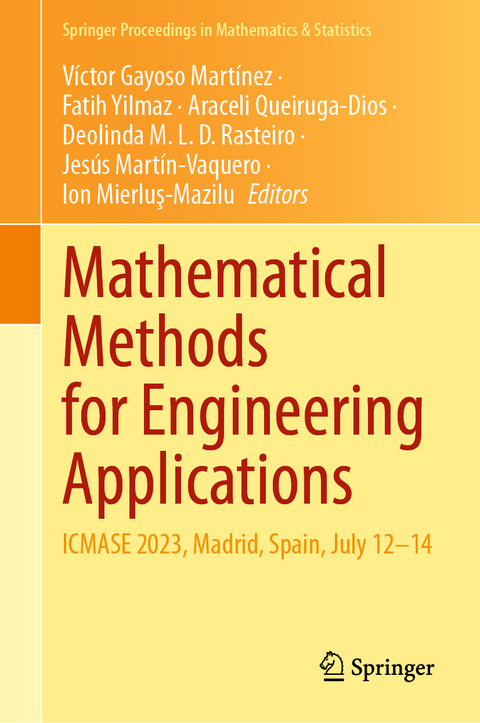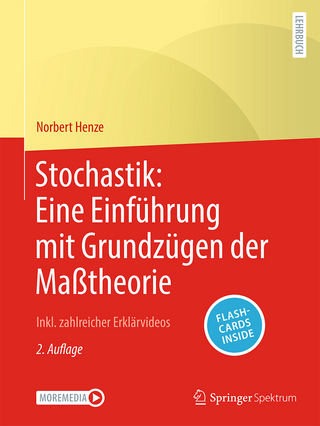
Mathematical Methods for Engineering Applications
Springer International Publishing (Verlag)
978-3-031-49217-4 (ISBN)
These proceedings gather selected, peer-reviewed papers presented at the IV International Conference on Mathematics and its Applications in Science and Engineering - ICMASE 2023, held on July 12-14, 2023 by the University Center of Technology and Digital Arts (U-tad) in Madrid, Spain.
Papers in this volume cover new developments in applications of mathematics in science and engineering, with an emphasis on mathematical and computational modeling of real-world problems. Topics range from the use of differential equations to model mechanical structures to the employ of number theory in the development of information security and cryptography. Educational issues specific to the acquisition of mathematical competencies by engineering and science students at all university levels are also touched on.
Researchers, practitioners, and university students can significantly benefit from this volume, especially those seeking advanced methods for applying mathematics to various contexts and fields.
lt;b>Víctor Gayoso Martínez was born in Madrid (Spain) in 1975. He graduated in Telecommunications Engineering from the Universidad Politécnica de Madrid in 2002. He obtained his Doctorate from the same university in 2010. Since 1998 he has worked on topics related to mathematics, cryptography, smart cards and Java technology in private companies (Telefónica), public research organisations (Spanish National Research Council, CSIC) and universities (Universidad Francisco de Vitoria and U-tad). He has published more than 25 articles in international journals and participated in more than 45 international conferences. He is the co-author of two books on Elliptic Curve Cryptography and Cyber Security. He currently teaches at Centro Universitario de Tecnología y Arte Digital (U-tad).
Prof. Dr. Fatih Yilmaz is full Professor in the Department of Mathematics at the Ankara Haci Bayram Veli University, Turkey. He obtained his PhD (2013) in Selçuk University (Konya). He is co-author of over 50 papers, and numerous contributions to workshops and conference talks and organizations. He is Editorial Member of the Turkish Journal of Mathematics and Computer Science, and participated as Invited Editor in Special Issues of journals. He has also participated in numerous European, National and Regional funding projects, and he obtained some mobility grants to stay at the Central European University (Budapest) and Coimbra University (Coimbra). His current research interests include the applications of matrix theory, graph theory, number theory and mathematical education based on projects and competencies. He serves as a guest editor of Axioms, Entropy and Mathematics, moreover he is assistant editor of Turkish Journal of Mathematics and Computer Science.
Araceli Queiruga-Dios was Graduate in Physics (Electronics specialty) at the University of Salamanca (Spain) and obtained her Ph.D. in Mathematics at the same university, in 2006. Her major field of study is public key cryptography. Before working at the university, she worked for a private company, dedicated to telecommunications and software solutions. From 2001 to 2006, she collaborated with the Department of Information Processing and Coding of the Spanish National Research Council, publishing papers about Public Key Cryptography and presenting (publishing) papers at national and international conferences, and journals. Since 2007, she works at the Department of Applied Mathematics at the School of Industrial Engineering at the University of Salamanca. She has participated as collaborator in several research projects at national and European level. Her current research interests include public key cryptography (digital signatures, authentication, and post-quantum cryptographic algorithms and protocols) and information security (propagation of malware and mathematical models). From 2018 to 2020 she coordinated the Erasmus+ Rules_Math, and she is currently coordinating the GIRLS project (Generation for Innovation, Resilience, Leadership and Sustainability. The game is on!), also co-funded by the European Union.
Deolinda M. L. D. Rasteiro was born in Angola in 1968 but lives in Portugal since 1974. She graduated Mathematics from University of Coimbra in 1992, master Statistics and Operations Research from University of Lisbon in 1997 and Doctorate on Mathematics in the field of Network Optimisation in 2006 on University of Aveiro. She is a Coordinator Professor at ISEC and teaches undergraduate (Statistic and Probability Methods to Mechanical and Informatics Engineering courses) and graduate levels (Applied Mathematics to Master of Electrotechnical Engineering, Master of Biomedical Engineering and Master of Physical Asset Management). She was ISEC's Vice-President from 2006 until 2010, responsible for ISEC's International Relations Office, Quality Office, Academic Services Office and Public Relations Office during that period. She was responsible for the
Chapter. 1. Modeling of Nitrogen, Phosphorus, and Potassium Concentrations in Lakes Affected by Soil Fertilization.- Chapter. 2. p-numerical semigroups of the triples of the sequence (an - bn)/(a - b).- Chapter. 3. Some Identities for Balancing and Lucas-balancing Numbers in Bidimensional Version.- Chapter. 4. Sequences of uncountable iterated function systems. The convergence of the sequences of fractals and fractal measures associated.- Chapter. 5. Method of Hydrodynamic Images and Quantum Calculus in Fock-Bargmann Representation of Quantum States.- Chapter. 6. On Leonardo numbers and Fibonacci fundamental system.- Chapter. 7. A quadratic estimation approach from fading measurements subject to deception attacks.- Chapter. 8. SOLO Taxonomy in the evaluation of engineering students: a case study in mathematics.- Chapter. 9. Is Collaborative Learning a Voluntary Process?.- Chapter. 10. Elliptic Biquaternionic Sequence with Vietoris' Numbers as its Components.- Chapter. 11. Teaching mathematics in STEM education.- Chapter. 12. Application of Discrete Wavelet Transform and Tree-Based Ensemble Machine Learning for Modeling of Particulate Matter Concentrations.- Chapter. 13. Fixed Point Theorems in Orthogonal F-Metric Spaces.- Chapter. 14. New Trends on Malware Propagation: from IoT Environments to Drone Swarms.- Chapter. 15. Forms of Assessment in view of Development of Mathematical Competencies.- Chapter. 16. Deep-Control of Memory via Stochastic Optimal Control and Deep Learning.- Chapter. 17. Exponentiated Weibull Mixture Cure Model to Handle Right-Censored Data Set.- Chapter. 18. On strong fuzzy partial metric spaces.- Chapter. 19. An Application of Linear Diophantine Fuzzy Sets to the Edge Detection Techniques.- Chapter. 20. Delamination Resistance of Laminated Glass Plates Having Ethyl Vinyl Acetate, Polyvinyl Butyral and Sentryglas Plus Interlayer.- Chapter. 21. Algebraic and Quantum Mechanical Approach to Spinors.- Chapter. 22. New G-Closed Sets With Related to an Ideal.- Chapter. 23. Service-learning activity in a Statistics course.- Chapter. 24. Fermatean Fuzzy Type a Three-Way Correlation Coefficients.- Chapter. 25. On Some Gaussian Oresme Numbers.
| Erscheinungsdatum | 03.04.2024 |
|---|---|
| Reihe/Serie | Springer Proceedings in Mathematics & Statistics |
| Zusatzinfo | XI, 348 p. 1 illus. |
| Verlagsort | Cham |
| Sprache | englisch |
| Maße | 155 x 235 mm |
| Themenwelt | Mathematik / Informatik ► Mathematik ► Wahrscheinlichkeit / Kombinatorik |
| Schlagworte | Algebra • Applications of Mathematics • Applied mathematics • Computer Science • cryptography • Discrete Mathematics • ICMASE • linear algebra • Math conference proceedings • Number Theory • Research • Undergraduate mathematics education |
| ISBN-10 | 3-031-49217-X / 303149217X |
| ISBN-13 | 978-3-031-49217-4 / 9783031492174 |
| Zustand | Neuware |
| Haben Sie eine Frage zum Produkt? |
aus dem Bereich


